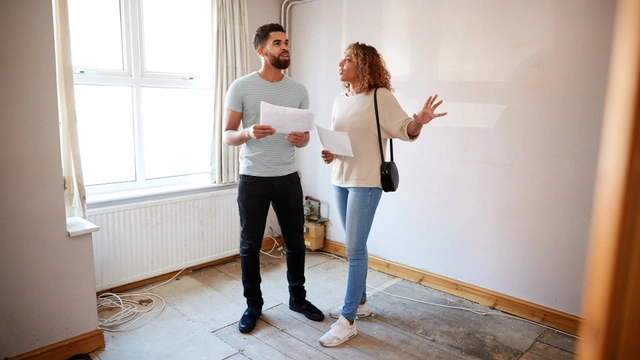You’ve done the legwork and found the home of your dreams.
Everything’s going well, but then your house survey has come back with some not-so-great news. Sound familiar? If it does, we’re here to help.
How to arrange a survey when buying a house
Getting a survey when buying a house is an important step to make sure you're making a good investment.
You'll need to hire a qualified surveyor who will assess the property's condition and identify any potential risks or necessary repairs.
It's important to choose the right type of survey based on the property's age and condition. For newer homes, a basic condition report might be enough, while older or more complex properties may require a more detailed homebuyer report or a full structural survey.
In the UK, as the buyer, you are responsible for organising and paying for the survey. It’s not something a solicitor will set up for you. In Scotland, the process differs slightly, as the seller is responsible for providing a Home Report, which includes a survey.
At what stage do you get a house survey?
Timing is key when arranging a survey. Ideally, you should book the survey within one to three weeks after your offer is accepted, but importantly, before the exchange of contracts. This allows you to address any issues that arise and potentially renegotiate the purchase price if the survey finds significant problems.
Red flags on your house survey
Here are a few things that some people see as deal breakers or red flags. These issues might put you off, or you might decide to still go ahead with the purchase and ask for some money off. But remember, some problems can be risky if not fixed.
Subsidence and heave
One of the biggest problems on a home report is subsidence, where the ground beneath a building sinks. There is also the opposite problem of heave, where the ground beneath a property rises. Both of these issues can cause structural damage and can make getting a mortgage and home insurance tricky.
Subsidence and heave are often caused by soil conditions, or by things like tree roots or leaking pipes. Fixing these problems usually requires underpinning. This involves strengthening the foundations of the house, which can be very expensive.
Japanese knotweed
Another potential deal breaker is Japanese knotweed. This plant can wreak havoc because it grows rapidly, and its deep roots can damage the structure of the building.
As a result, you may find it difficult to get a mortgage or insurance if there’s Japanese knotweed present. Plus, it could make it harder to sell the house in the future.
Deal-breaking solicitor finds
Your solicitor will carry out several checks, which may uncover problems with the house or area you’re looking to move to. Here are a couple of examples:
Flood risk
If the property is in a flood-prone area, you could face high insurance premiums and the constant worry of water damage. It's a big consideration, especially with the increasing frequency of extreme weather events.
Also, you might struggle to find a company willing to insure your home, and if you do, it’s probably going to cost you more.
Unapproved home modifications
Sometimes, previous owners make changes to the property (such as building an extension) without getting the necessary planning permissions.
In this case, your solicitor may suggest that you take out indemnity insurance. This protects you from an expensive bill in the future if the local authority decides to pursue a claim because you don’t have a building regulation certificate.
If there are house survey problems, who pays?
In the UK, if a house survey reveals problems, the responsibility for addressing these issues typically falls on the buyer. The buyer arranges and pays for the survey, so any problems identified are initially their concern.
However, the buyer can use the survey results to negotiate with the seller. For example, you might ask the seller to lower the purchase price or cover the cost of necessary repairs before completing the sale.
If significant issues are found, the buyer can also choose to cancel their offer altogether. It's important to note that sellers are legally required to disclose known issues with the property through the Seller’s Property Information Form (TA6).
If a seller doesn’t disclose a problem that they were aware of, the buyer may have legal grounds to seek compensation or even rescind (cancel) the sale.
Not all issues are deal breakers
Some problems that show up in your home report might put you off, but they could be much cheaper fixes. And, if you truly love the property, the investment might be worth it.
Think about the pros and cons, and how much you can afford to spend on doing the place up.
Damp
Most damp problems are treatable. For example, buying a dehumidifier and improving ventilation indoors can help get rid of damp caused by condensation. Penetrating damp can be treated by stopping water from coming in. Rising damp could be more costly to fix, as you will need a specialist to take a look.
Low energy efficiency
When buying a property, the seller will have to provide you with an Energy Performance Certificate (EPC). This is a standardised document that provides information about a property's energy efficiency. It includes details on the how much energy the property uses, how much that energy costs, and recommendations for improving efficiency.
Energy-saving features like double glazing and insulation are important. If the building lacks them, you might want to consider getting these jobs done.
Double glazing can be expensive, but you’ll save on your energy bills as your home won’t be leaking heat. You may be able to get insulation done for free by your energy provider. If not, it’s pretty cheap to fit yourself.
Electrical issues
If your home report says the property needs rewiring, don’t ignore it. While it’s costly and disruptive, faulty electrics pose a serious safety risk.
What to do if your house survey is bad
If your surveyor or solicitor has found issues with your new property, don't panic! It’s understandable that you’re nervous about your house survey, but you can simply follow these steps:
Speak with your surveyor
Read through the survey report carefully and if you're unsure about anything, get in touch with your surveyor to go over the details. They can explain everything to you.
Get quotes for repairs
Once you know what the issues are, get quotes from reputable contractors for the repair work. This will give you a clear idea of the costs involved. It's best to get a few different quotes to make sure you're getting a good deal.
Negotiate with the seller
Armed with your quotes, you can go back to the seller and negotiate. If the repairs are going to be costly, you might be able to get the seller to lower the house price or agree to fix the issues before you move in. Remember, you're in a strong position to negotiate, so don't be afraid to ask for what you need.
Consider the long-term
Some problems might need quick fixes, while others could be more serious and expensive to address. Consider whether you're willing to take on the responsibility and cost of fixing the issues, or if it might be better to walk away and find another property.
Stay positive
Even if this house doesn't work out, there are plenty of other properties out there. Many buyers go through multiple surveys before finding the right property. Your dream home is still waiting for you. Good luck, and happy house hunting!
Read on to find out if you need a survey on a new build.









